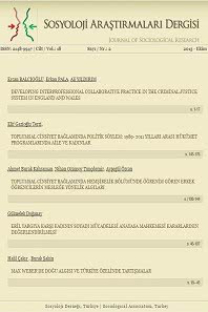Türkiye'de Uzaktan Öğretim Sistemi: Açık Öğretim Öğrencileri Üzerine Sosyolojik Bir İnceleme
Bu çalışma Türkiye 'de açık öğretim sistemi içerisinde eğitim ve öğretim gören öğrencilerin sosyal ve ekonomik profillerini ortaya çıkarmayı amaçlamaktadır. Türkiye'de uzaktan eğitim açık öğretim adı altında Anadolu Üniversitesi bünyesinde 1982 yılından beri yürütülmektedir. 2005 yılı itibariyle büyük bir bölümü yurt içinde olmak üzere KKTC ve Avrupa ülkelerinde açık öğretim sistemine dahil olan öğrenci sayısı bir milyona yaklaşmıştır. Bu oldukça büyük bir rakamdır. Bu sayısal büyüklük, Türkiye'de eğitim sistemi içerisinde önemli bir yer oluşturan açık öğretim öğrencilerinin sosyal ve ekonomik profillerinin belirlenmesi gerekliliğini ortaya çıkarmaktadır. Sosyolojik açıdan açık öğretim öğrencilerinin hangi gelir grubunda^ geldikleri, medeni durumları, cinsiyet ve yaş dağılımları, ağırlıklı olarak kırsal ya da kentsel kökenli mi oldukları, istihdam durumları, neden açık öğretimi tercih ettikleri ve Türkiye'de eğitim sisteminin işleyişi hakkında neler düşündüklerinin belirlenmesi Türkiye'de "açık öğretim gerçeğinin" daha iyi anlaşılmasına katkıda bulunacaktır.
Anahtar Kelimeler:
Türkiye
Distance Education System in Turkey: A Socio-Logical Research on Students Enrolled in Open Education
This paper examines social and economic profiles of students who are enrolled in open education in Turkey. In Turkey, open education system was firstly introduced by Anadolu University in 1982. As of 2005, numbers of students who are currently registered in open education in Turkey, Northern Republic of Cyprus and Europe approached one million. The most of these students presently reside in Turkey. Since the number of students in open education increases rapidly in Turkey, it sociologically becomes necessary to look at social and economic characteristics of those students who study in open education. Thus, it is important to understand those students' level of income, gender formation, rural-urban origins, age groups, type of employment, preferences for open education and opinions about the education system in Turkey. This paper aims to fill this void and understand the world of students in open education in Turkey.
Keywords:
Turkey,
___
- AÇIK ÖĞRETİM FAKÜLTESİ ÖĞRENCİ PROFİLİ ARAŞTIRMASI 2003 AÖF Çalışma Raporu
- BARKAN, Murat ve Bahire EFE ÖZAD 2004"Open Learning: Communicating with the Learner" The Turkish On-line Journal of Educational Technology (TOJET), Vol.3, Issue 3, ss.43-49.
- BEAUDOIN, Michael F. 2003 Distance Education Leadership for the New Century", Online Journal of Distance Learning Administration, Vol.6, Issue.2, Yaz 2003, State University of West Georgia, Distance Education Center.
- BELL, Daniel 1973 The Coming of Post-Industrial Society, New York: Basic Books.
- CASTELLS, Manuel 1996 The Rise of the Network Society, Mass: Blackwell.
- DEMİRAY, Uğur 1991 "Identification of the Distance Education Students in Turkey: A Case Study Open Education Faculty", Indian Journal of Distance Education, Vol.4, ss.83-91.
- DEMİRAY, Uğur 1993 Açık Öğretim Fakültesi Yetişkin Yaşlı Mezunları, Eskişehir: Anadolu Üniversitesi Yayınları No: 629/338.
- DEMİRAY, Uğur 2002 "Live TV for Support of Student Exam Preparation: A Pilot Study at Anadolu University's Distance Education System", International Journal of Technologies For the Advancement of Knowledge and Learning, Vol.4, Issue 2, ss.48-50.
- DHANARAJAN, Gajaraj 2001 "Distance Education: Promise, Performance and Potential", Open Learning, Vol.16, No.l, ss.61-68.
- FAITH, Karlene (ed.) 1988 Toward New Horizons For Women in Distance Education: International Perspectives, London and New York: Routledge.
- FOUCAULT, Michel 1995 İktidar ve Direnme Odakları, Çev. Ali Akay, İstanbul: Bağlam Yay.
- HAKAN, Ayhan., Aydın Ziya ÖZGÜR, Erdal KARA, Dilruba KÜRÜM ve Berrin ÖZKANA
- 2004 Açık Öğretim Sistemi Lisans Programlarının Değerlendirilmesi, Eskişehir: Anadolu Üniversitesi Yayınları No: 1554.
- HIPLE, David ve Stephen FLEMING 2002 "Models for Distance Education in Critical Languages", iç. New Technologies and Language Learning: Iissues and Options (der. C. A. Spreen ), Honolulu, University of Hawaii, Second Language Teaching & Curriculum Center (http://nflrc.hawaii.edu/networks /tr25/TR25-l.pdf.).
- HOLLOWAY, Robert, E., ve Jason OHLER 1991 "Distance Education in the Next Decade", iç. Instructional Technology, Past, Present, and Future (der. G.J. Anglin), Englewood, CO: Libraries Unlimited, ss. 259-266.
- HOWELL, Scott L.; WILLIAMS, Peter B. ve LINDSAY, Nathan K. 2003 "Thirty-two Trends Affecting Distance Education: An Informed Foundation for Strategic Planning", Online Journal of Distance Learning Administration, Volume VI, Number III, Güz 2003, State University of West Georgia, Distance Education Center.
- KESİM, Mehmet 2005 "E-Learning Via Cooperative Use of DVB and High Speed Internet: Convergence of Broadcasting and Internet", Yayımlanmamış Konferans Sunuşu, Lifelong E-Learning. EDEN 2005 Annual Conference, Helsinki, Finland.
- MARGINSON, Simon 2004 "Don't Leave Me Hanging on the Anglophone: The Potential for Online Distance Higher Education in the Asia-Pacific Region",
- ÖZGÜR, Aydın Ziya 2000 "Eğitim Programlarında Öğrenci ve Öğretici Arasında Etkileşime Yönelik Olarak Canlı Yayınların Kullanılması ve Açık Öğretim Fakültesi Uygulaması", Bilişim Teknolojileri Işığında Eğitim Konferansı ve Sergisi, Ankara.
- ÖZKUL, Ali Ekrem ve Mehmet KESİM 1999 "Use of Information Technologies in Open Education: Opportunities, Limitations", Yayımlanmamış Konferans Sunuşu, Information Technology Supported Education Conference, Ankara.
- WHEELER, Steve 2005 "Information and Communication Technologies and the Changing Role of the Teacher", Journal of Educational Media, Vol.26, No.l, ss.7-18.
- ISSN: 2148-9947
- Yayın Aralığı: Yılda 2 Sayı
- Başlangıç: 2010
- Yayıncı: Sosyoloji Derneği
Sayıdaki Diğer Makaleler
Küreselleşme ve İyi Yurttaşın Ölçüleri
Kimlikler Çağında Toplumsal Sınıf
Şehriban KAYA ŞAHİN, İbrahim KAYA
Semra GÜNEY, Öznur AŞAN, Çisil AKALIN
Yeniköy'de Yaşayan Arnavut Göçmenler Üzerine Sosyolojik Bir Araştırma
Nitel Araştırmalarda Veri Analiz Süreci ve Bilgisayar Programlarının Katkıları
Türkiye'de Uzaktan Öğretim Sistemi: Açık Öğretim Öğrencileri Üzerine Sosyolojik Bir İnceleme
